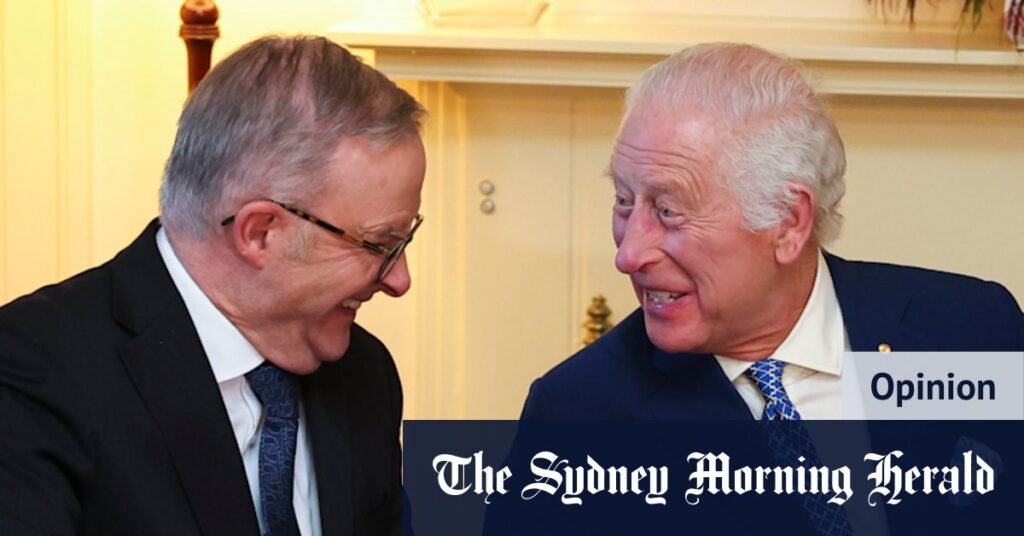
Anthony Albanese’s recent visit to King Charles at Balmoral has underscored his position as the fifth successive republican Labor prime minister unable to advance the republican cause in Australia. Despite this, Albanese appears unfazed by the setback. The allure of the monarchy, with its global celebrity status, may have influenced his stance, or perhaps he perceives a shared progressive spirit with King Charles, who is often seen as more radical than some of the most leftist public figures.
The announcement comes as Albanese distances himself from the idea of holding another referendum during his tenure. The failure of the Voice referendum marked a significant low point in his leadership, a setback from which he struggled to recover until the 2025 elections. In a candid interview with David Speers on ABC’s Insiders, Albanese confirmed that no further referenda would be pursued under his leadership, emphasizing, “I think I’ve made it clear that I wanted to hold one referendum while I was prime minister, and we did that.”
The Historical Context of Australian Referenda
Australia’s history with referenda is fraught with challenges. Of the 45 nationwide referenda, only eight have been successful. This track record has made referenda a graveyard for reformers’ ambitions, with notable failures including the 1999 republican referendum and the 1988 proposal to extend parliamentary terms. The reluctance to engage in further referenda is understandable, given the political risks involved.
In contrast, the United States Senate has historically been a barrier to reform, blocking crucial civil rights and gun control legislation. Similarly, Australian referenda have stymied progressive changes, leaving the republican movement in a state of inertia since the 1999 defeat.
Progressive Patriotism and Political Realities
Albanese’s approach to governance has been characterized by “progressive patriotism,” a concept he has championed as a counter to nationalistic populism. This theme was central to his speech at the National Press Club, where he sought to imbue his election victory with broader significance. However, without a push for republicanism, this vision appears incomplete.
Meanwhile, in the UK, Labour leader Keir Starmer has similarly embraced patriotic rhetoric, urging citizens to take pride in their national identity. This strategy aims to counter the rise of far-right movements, but in Australia, the absence of republicanism within this framework raises questions about its coherence.
The Monarchy’s Enduring Influence
The monarchy remains a potent symbol in Australia, with King Charles enjoying a period of renewed relevance. The rise of authoritarian figures globally has paradoxically enhanced the appeal of a constitutional monarch, who is seen as a stabilizing force in turbulent times. This dynamic has further entrenched the monarchy’s position in Australia, despite the republican aspirations of past Labor leaders.
The indifference of the Australian public towards the monarchy has been its greatest strength, as noted by Malcolm Knox. This sentiment, coupled with the apparent disinterest from a republican prime minister, has solidified the monarchy’s status in the country.
Looking Ahead: The Future of Republicanism in Australia
The failure of the republican referendum in 1999 continues to cast a long shadow over the movement. The “no” vote marked the end of an era of reform, leaving the republican cause in a state of dormancy. As Australia grapples with questions of sovereignty and national identity, the monarchy remains a symbol of continuity amidst change.
The potential for a renewed republican push remains uncertain. While the allure of a home-grown head of state persists, the political appetite for such a change appears diminished. For now, the monarchy’s position seems secure, bolstered by both public indifference and a lack of political will from the current government.
As Australia navigates its place in the 21st century, the debate over republicanism remains a poignant reflection of its broader political and cultural identity. The path forward will require careful consideration of the nation’s values and aspirations, balancing tradition with the desire for progress.
Nick Bryant is the author of The Rise and Fall of Australia: How a Great Nation Lost its Way.
Cut through the noise of federal politics with news, views, and expert analysis. Subscribers can sign up to our weekly Inside Politics newsletter.






